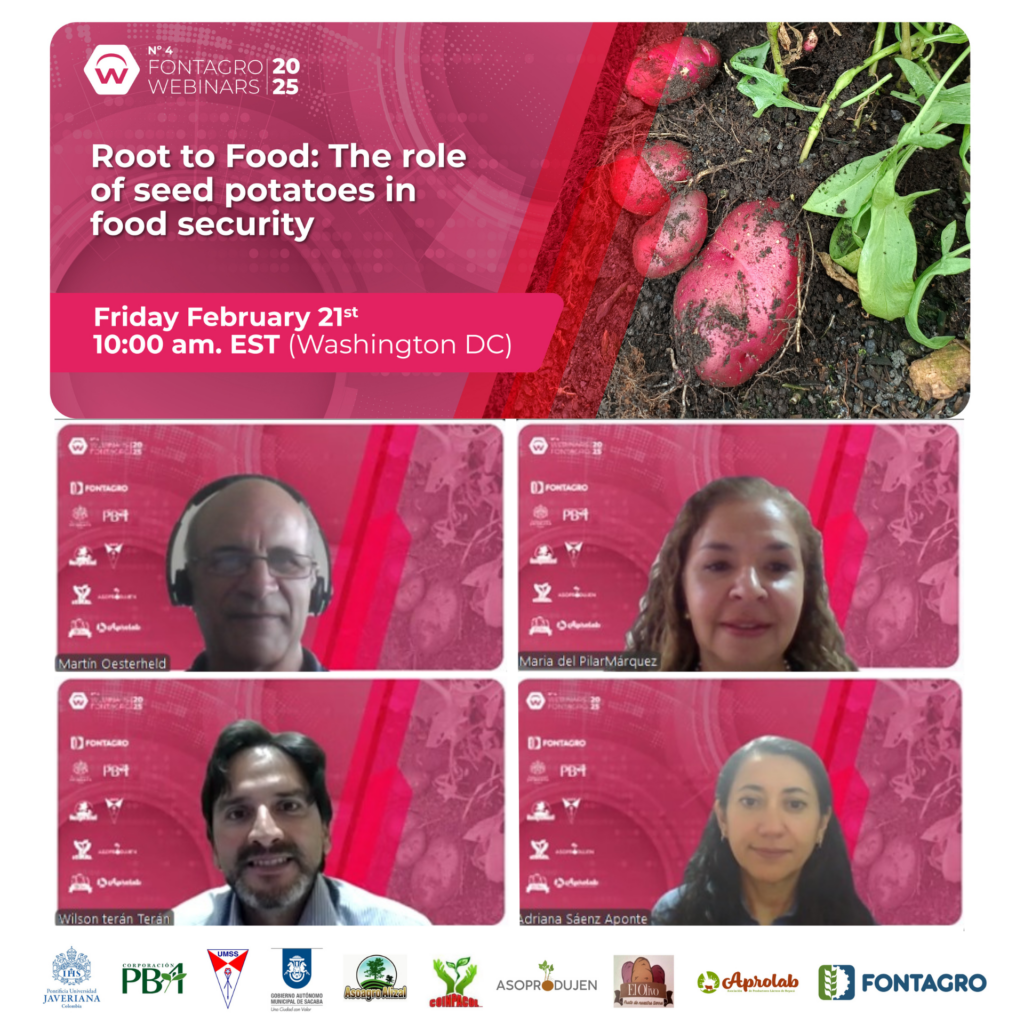
In a context where food security is crucial for rural communities in Latin America, the project “Improving the yield of potatoes and other Andean tubers – Root to Food”, funded by FONTAGRO and implemented by Pontificia Universidad Javeriana, the Corporation for Participatory and Sustainable Development of Small Rural Producers (PBA), Colombia, and the Universidad Mayor de San Simón (UMSS), in partnership with the Autonomous Municipal Government of Sacaba, Bolivia, and cooperatives of farmers and producers from both countries, concluded its activities with significant results presented in this virtual seminar.
During the webinar, the major challenges faced by small-scale farmers were discussed, particularly the improvement of seed quality, which contributes to the yields of traditional crops. Additionally, climate change affects soil fertility and impacts crop diversity.
Through the participatory development of technological packages and productive chains, the project has strengthened the economy of family agricultural production units. The collaborations established have led to the creation of a Territorial Innovation System, resulting in the production of native potatoes with improved agricultural practices and a reduction in production costs of up to 25%.
Among the most notable achievements, the project successfully produced and distributed approximately 7,000 minitubers of native varieties to Colombian producers, in addition to conducting morphological and molecular characterization of local varieties in both nations. The genome sequencing of cubio (Tropaeolum tuberosum) has opened new possibilities for the genetic improvement of these crops.
This webinar brought together expert researchers who discussed the strategies implemented in the project regarding innovation and pest monitoring, establishing planting models for both monocropping and polycropping. This approach has demonstrated that cubio yields significantly more than native potatoes under polycropping conditions. As a result, strengthening tissue culture laboratories is crucial to ensuring farmers have access to high-quality seeds.
This project underscores the importance of international collaboration and the use of participatory technologies to address the challenges faced by farmers in the Andean region. Sustainability and the conservation of agricultural biodiversity are essential to ensuring food security in the context of climate change.
For more information about the Root to Food project and other similar initiatives, visit:
https://webstories.fontagro.org/propuesta154/en
To watch the recording of this webinar, visit:
https://www.youtube.com/live/75oY2U2yEcA?si=j1YilLqa_YyRiLCh
***
About FONTAGRO
FONTAGRO was created 1998 with the purpose of promoting the increase of the competitiveness of the agri-food sector, ensuring the sustainable management of natural resources and the reduction of poverty in the region. The objective of FONTAGRO is to establish itself as a sustainable financing mechanism for the development of agricultural technology and innovation in Latin America and the Caribbean and Spain, and to establish a forum for the discussion of priority topics of technological innovation. The member countries are: Argentina, Bolivia, Chile, Colombia, Costa Rica, Ecuador, Spain, Honduras, Nicaragua, Panama, Paraguay, Peru, Dominican Republic, Uruguay and Venezuela. In the last 27 years 204 regional agricultural innovation platforms have been co-financed for an amount of US $ 150.7 million, which has reached 531 institutions and 35 countries worldwide.
